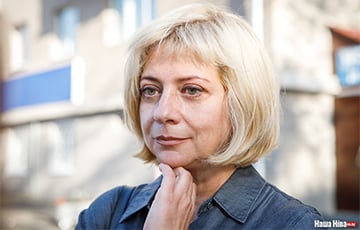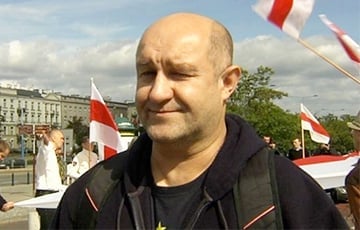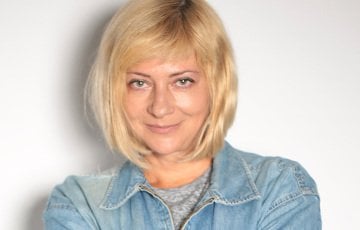Women In Slaughterhouse
32- 7.02.2025, 17:08
- 36,494

PHOTO: NASHA NIVA
Surviving is heroism.
Every time I sat down to write a new article about Palina Sharenda-Panasiuk, I promised: let only Palina get out, let only get out of hell, and I will no longer write about her. A week ago, Palina got out of the hell, and yesterday she was safe. But it turned out that it was still impossible not to write about it.
Palina is still beautiful and brave. Her first words on the platform of the Vilnius railway station were "Long Live Belarus!". The second was the words about those who stayed there, in the slaughterhouse. That's exactly what Palina called penal colony No.24, a prison in the Rechytsa district (Belarus) for repeat offenders. They made a special, with special cynicism, repair in the cell-type ward – now this basement is akin to Lubyanka or even medieval, where you can go crazy and lose your health in a couple of days. Palina was kept there for months. She remembered that she had only gone out eight times in a year. The rest of the time – punishment cell — cell-type room — punishment cell. This circle is unbreakable.
But Palina doesn't talk about herself. Neither about her own torture, nor about four years of hell, nor about nightmares that did not stop for a minute. She talks about other women who stayed there, in Zarechcha - about Volha Mayorava, Viktoryia Kulsha, Alena Hnauk. About the endless hunger strikes that Kulsha held for months in her cell-type room. That the authorities are preparing the next criminal cases under Article 411 against the prisoners, so as not to let them out of the slaughterhouse. Palina went through new courts three times and survived four prison sentences in total. But barely stepping off the train, barely embracing her husband, barely taking a free breath, she began speaking about her friends who remain in the slaughterhouse. Now Palina fights for them. Her sentence isn't over as long as they stay there.
Volha Mayorava was detained the day after Palina – on January 4, 2021 – in the case of Mikalai Autukhovich. Volha was managing his telegram channel, for which she received a sentence of 20 years in prison. Last year, she was added another year and a half to the twenty-year term under Article 411. During the initial investigation, Volha was not tried on terrorism charges, despite their strong desire to do so. The KGB agents could neither find nor fabricate anything other than her running the Telegram channel. But they nevertheless included her name in the list of terrorists. Despite the twenty-year period, they could not resist the pleasure of adding another year and a half – most likely, specifically to transfer her to Zarechcha. In the Homel penal colony, despite the same monstrous conditions, there are many women political prisoners – many more than detachments. And, after all, you can't isolate these women from each other. This means that they have much more opportunities to support each other. In the Rechytsa penal colony, you can count the political prisoners on the fingers of one hand. And they all wander from a cell-type room to a punishment cell, all are in isolation.
Viktoryia Kulsha, like Palina, has already been convicted under Article 411 three times. Former prisoners of the Homel penal colony said that even before the "malicious disobedience", in penal colony No.4, Viktoryia told the deputy head of the colony: "Remove the epaulets, otherwise I will rip them off." It wasn't just disobedience, it was rebellion. Kulsha was quickly sent to Zarechcha to be finally isolated. According to Palina, Viktoryia, in protest, not only went on a hunger strike but also slit her veins in a punishment cell. Self-harm is monstrous, but the only method of resistance available to a prisoner in the conditions in which prisoners of penal colony No.24 find themselves.
It seems that Alena Hnauk was driven the same way to send her to the slaughterhouse as soon as possible. At first, it seemed like some kind of home arrest again and again. Then – three and a half years in prison for "discrediting the Republic of Belarus". The penitentiary, hunger strike, the Navinki psychiatric clinic, and, finally, the same Article 411. A recidivist, a dangerous element, colony No.24 and again a punishment cell and cell-type room. All of them – Hnauk, Mayorava, Kulsha – practically do not leave punishment cells. If they do come out, it is usually only to be accused of another violation of the regime and return to punishment cells.
We used to think that heroism is to come out with a flag, shout a slogan in court, go towards the chain of riot police. But in Belarusian prisons, heroism is about surviving. Just to survive in an environment where they are trying to kill you every day. Thousands of Belarusian political prisoners are trying to survive. They are our heroes. It is our duty to bring them home.
One woman, a former political prisoner, said that back in the Homel penal colony, where political prisoners were certainly put in the shop to sew police uniforms, Palina said: "They desecrate us." They didn't desecrate you, Palina. On the contrary, it gave their miserable lives meaning. Someday, after all, grandchildren will be told that they were acquainted with Sharenda-Panasiuk. And that's all they've achieved.
Iryna Khalip, especially for Charter97.org











